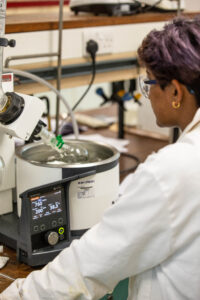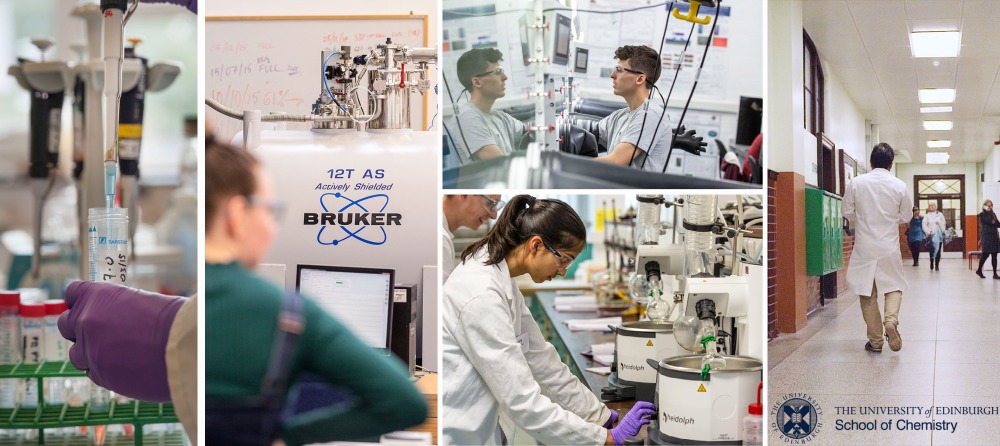Welcome to the Research at EdChem Blog!

Have you ever wondered what a chemist does? What about the role chemists play in society?

A chemist working in an organic chemistry lab in the Christina Miller Building. This type of lab is a “wet” lab and is where chemicals are mixed together to make something new.
We’re here to show you what real-life chemists do in the many different types of labs that chemists use to explore the world around us and to solve the global issues that affect us all. This blog will explore the role of chemists in society by showcasing the science conducted within the School of Chemistry at the University of Edinburgh. Each blog post will cover a recent publication from an Edinburgh Chemistry research group or will showcase the work of one researcher in the department and will be written by one of our fantastic students.
Our aim is to enable all members of society to be a part of the excellent and interesting research happening in Edinburgh Chemistry by targeting our blog posts to the general public – expect little scientific jargon! We want to share the fantastic science conducted by our researchers and students with you!
Chemistry at Edinburgh
The School of Chemistry sits on the King’s Buildings Campus in Edinburgh and is housed within the Joseph Black and Christina Miller Buildings. This is where our academic members of staff and their groups of scientists conduct their research in a myriad of different environments from wet labs to computer labs. These groups work to understand vital concepts to deepen our knowledge of the world around us and to contribute to the solution of global problems such as climate change and antibiotic resistance.
There are more than 40 active research groups in the School of Chemistry containing over 190 PhD students and more than 40 Postdoctoral Researchers. Each research group is led by an academic member of staff and experiments within a research “themes” meaning each group has its own expertise. These groups contain post graduate students, called PhD students, who are working towards achieving their doctoral degrees by undertaking a large research project and writing a thesis of their work. Postdoctoral Researchers are members of staff who have achieved their doctorate and work as research scientists and mentors to PhD students within research groups. Our undergraduate students partake in summer research projects and/or their final year projects within a research group in the School of Chemistry. These junior group members conduct a short project intended to be written up as part of a summer project report or a final year dissertation.
How research goes from idea to publication
Research work often begins with a question derived from a gap in the scientific communities knowledge of a topic. An academic group leader will devise a project to address this question and PhD students and/or Post Doctoral Researchers are tasked with undertaking the practical research work and thus helping to hone the approach to the initial research question. Research projects are rarely straight forward and there will be many strategic discussions between the academic group leader and the students/researchers on the project where up-to-date project results help decide which direction to take the project to answer the initial question posed.
When these projects are completed, the academic group leader (and oftentimes the students/researchers who worked on the project) writes the findings of the project as a journal article (or “publication”) to communicate the findings to the world-wide scientific community. This means that the findings of this project will be added to the literature that is searchable by scientists all over the world. This blog will cover the research conducted within the School of Chemistry by covering the journal articles written by the research groups within our department.
Sharing science
We look forward to sharing the exciting, cutting-edge chemistry that happens in the School of Chemistry at the University of Edinburgh! Check back regularly for new blog posts to learn more about the innovative chemistry conducted at Edinburgh. If you are a teacher, we hope this blog will be useful for sharing with your pupils as an example of what real-life chemists do!

A sample of the research work conducted in labs within the Joseph Black and Christina Miller Buildings.




Act lab is one of the best scientific laboratory website which experiences chemistry experiments.